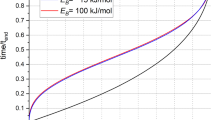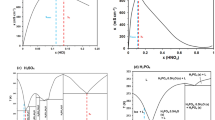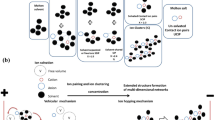Abstract
RECENTLY, Rastogi, Batra and Dass1 have reported that potential differences are produced when crystals of an electrolyte just appear or when they are allowed to dissolve. The former has been called the precipitation potential and the latter the dissolution potential. One of the important conclusions of this study is that the dissolution potential of an electrolyte, in an aqueous solution of the same, is a function of the concentration and that its value increases as the dilution is increased. The dissolution potential was also seen to increase systematically in most cases as the temperature of the water is increased. This seems logical, for the dissolution potential must be related in some manner to the solubility of the electrolyte as the term implies.
This is a preview of subscription content, access via your institution
Access options
Subscribe to this journal
Receive 51 print issues and online access
$199.00 per year
only $3.90 per issue
Buy this article
- Purchase on Springer Link
- Instant access to full article PDF
Prices may be subject to local taxes which are calculated during checkout
Similar content being viewed by others

References
Rastogi, R. P., Batra, B. P., and Dass, R. K., Nature, 191, 764 (1961).
International Critical Tables, 4, 251 (McGraw Hill, 1928).
Author information
Authors and Affiliations
Rights and permissions
About this article
Cite this article
SRIVASTAVA, R., ABROL, I. & KHURANA, O. Observations on the Dissolution Potential of Oxalic Acid. Nature 216, 682–683 (1967). https://doi.org/10.1038/216682a0
Received:
Issue Date:
DOI: https://doi.org/10.1038/216682a0
Comments
By submitting a comment you agree to abide by our Terms and Community Guidelines. If you find something abusive or that does not comply with our terms or guidelines please flag it as inappropriate.


